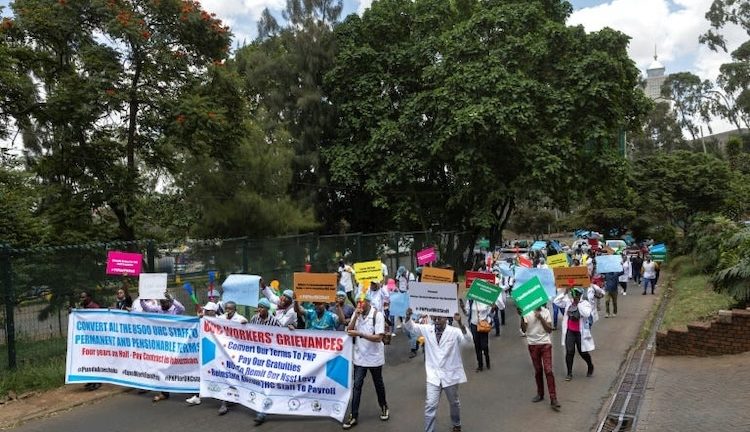By Lisa Vives, Global Information Network
NEW YORK | 8 April 2024 (IDN) — Kenya’s health sector, underfunded and understaffed, is closed for business until the government makes good on salary arrears and agrees to hire badly needed trainee doctors as promised to the union.
The Kenya Medical Practitioners, Pharmacists, and Dentists Union (KMPDU) also wants the government to address frequently delayed pay cheques and compensation for doctors who work in public hospitals as part of their higher degree courses.
The crippling strike, now in its third week, involves some 4,000 public sector doctors or approximately half of the country’s 9,000 registered doctors. The question of salary arrears stems from a 2017 collective bargaining agreement that, among other things, set medical interns’ pay at 206,000 Kenyan shillings ($1,566) per month and tracks their clearance to work at health facilities upon graduation.
Qualified medical graduates in Kenya struggle to get jobs, striking workers say, despite staff shortages at public hospitals. The union wants the government to hire over 3,000 medical interns who are currently unemployed. However, the health ministry said it lacks the resources to recruit them.
Despite a policy requiring the government to place medical interns within 30 days of completing their studies, graduates remain jobless long after qualifying to practice medicine.
Talks between the two sides to end the strike have been unsuccessful. Other health workers, who are helping to keep hospitals running in the absence of doctors, have now joined the strike, and local media is reporting.
“The strike will take as long as it takes the government to wake up,” said Dr. Onyango Ndong’a on Citizen Television.
But the government seems unlikely to budge, hoping to wait out the doctors. Kenyan President Ruto recently declared there would be no additional monies for interns above the monthly $538 (70,000 Kenyan shillings), claiming the government was “struggling with a high tax bill.”
Only around 3.7% of the budget on health
The impact of the three-week strike is being felt across the country, with many patients left unattended or turned away from hospitals in the East African nation.
Despite the President’s claims of insufficient funds, Kenya only spends around 3.7% of its budget on health—less than the 5% recommended by the World Health Organization for low and middle-income countries—to achieve universal health care or the 15% it committed to spending on health as part of the Abuja declaration.
“It’s not just health,” Anderson Njuki, a Nairobi-based economist, told the online publication Semafor, “because the country is spending much of its revenues on servicing debt, social spending and development.”
Without jobs or decent wages, qualified Kenyan medical professionals would accelerate their migration abroad, Njuki added, severely weakening Kenya’s already troubled public health system.
Nurses have not joined the striking doctors despite pressure from some members.
“The issues doctors are pushing are genuine and should be implemented,” said Kenya National Union of Nurses Secretary General Seth Panyako. “The government is supposed to release funds to hire interns. But we’re not going on strike; we’re going to the courts. [IDN-InDepthNews]
Photo: Striking doctors protesting. Source: Global Information Network
IDN is the flagship agency of the Non-profit International Press Syndicate


